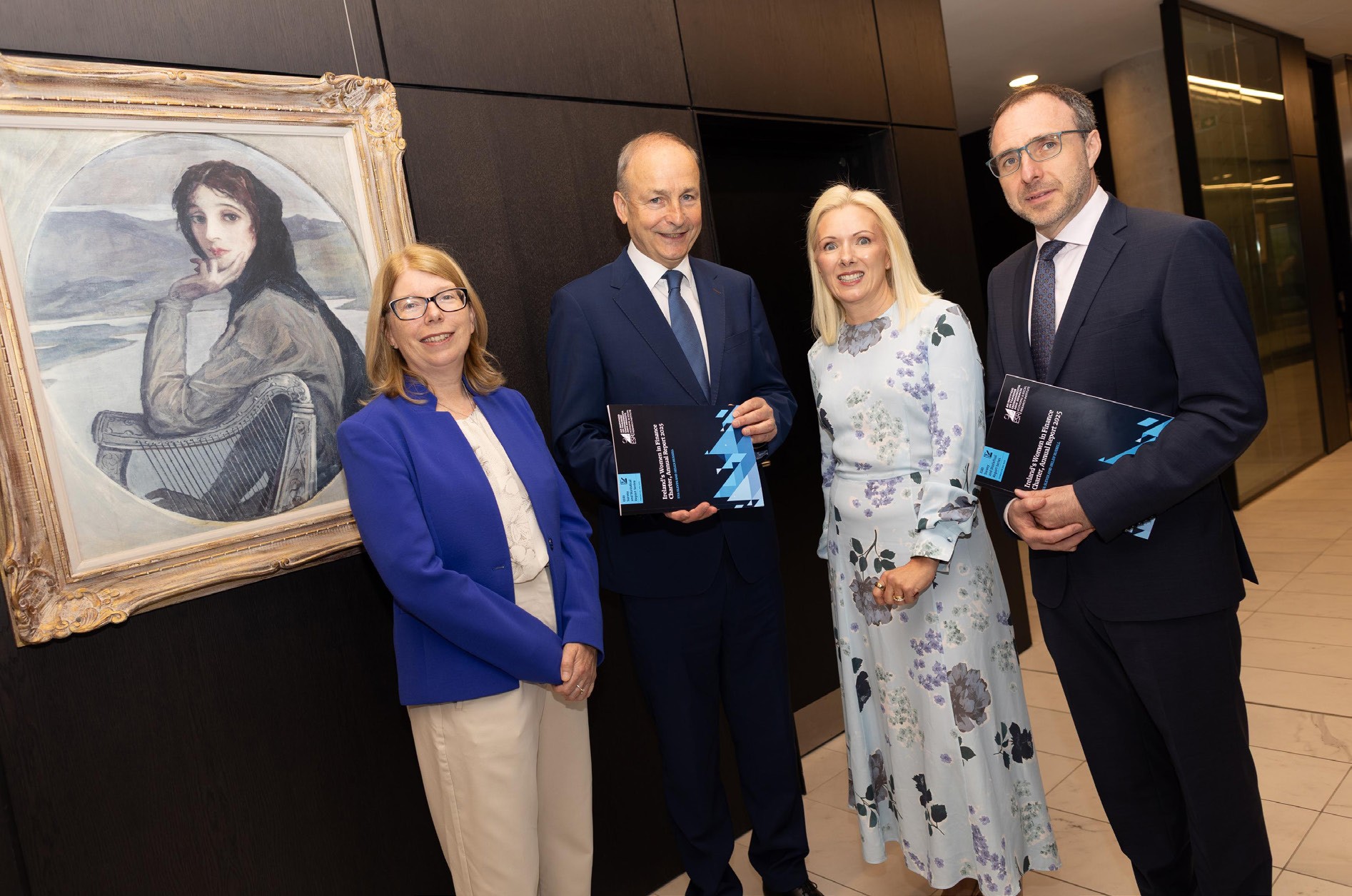Female representation in financial services on the rise
The latest annual report from Ireland’s Women in Finance Charter shows a marked rise in women in senior roles in financial services—but barriers to equal representation remain

Female participation in senior financial services roles has increased substantially over the last three years, the latest figures from Ireland’s Women in Finance Charter have revealed.
Published on 17 July, the third annual report on Ireland’s Women in Finance Charter showed a marked increase in baseline female representation levels since firms first signed up to the initiative in 2022.
Average female representation at board level now stands at 36.3 percent, the report found, compared to 30.3 percent at the outset. Representation at senior management level has risen to 43.4 percent, compared to 36.2 percent in 2023.
Female CEOs at 22.6 percent
The proportion of female Chief Executives among the Charter’s 100 signatory firms has risen to 22.6 percent, up from 19.4 percent in 2023 .
“This year’s report demonstrates continued progress in growing female participation in the financial services sector in Ireland,” said Dr. Helen Russell, Research Professor with the Economic and Social Research Institute (ESRI) and co-author of the report.

“Female representation has reached 50 percent of all employees in our signatory firms, a marginal increase on last year at 49.3 percent,” Russell added.
“While there is still work to be done, the targets set out by signatory firms demonstrate ambition and have the potential to encourage organisations in the wider economy to promote increased female participation in their sectors.” The report also revealed, however, the need for both organisational and government policies to address gender inequalities effectvely, Russell added.
“At the firm level, actions to support internal advancement of women to more senior roles were seen as highly effective. These included strategies such as mentoring, leadership training and succession planning,” she said.
“At the government level, addressing gaps in childcare coverage is essential.”
Equal representation attracts FDI
“Ireland’s Women in Finance Charter has been a resounding success in promoting female representation in the financial services sector. From an employee perspective, it fosters a sense of pride in the workplace when your employer is seeking to make a positive change in society. By encouraging more female participation, and consequently the level of talent and skills in the financial services workforce, the initiative is also of benefit to Ireland’s attractiveness for foreign direct investment” — Robert Troy, TD, Minister of State for Finance with responsibility for Financial Services, Credit Unions and Insurance
Barriers to equality
While there has been a marked increase in female participation at senior level, the rate of female participation at junior management and in technical and professional roles has remained static this year at 49 percent.
The latest Ireland’s Women in Finance Charter report also revealed a marginal drop in the female share of middle management positions—at 47.1 percent as of January 2025 compared to 47.6 percent last year.
Eva Slevin, ESRI co-author of this year’s annual report, also noted the challenges to achieving full equal female representation in the workplace cited by Charter signatories.
“These barriers included low turnover rates in senior positions, fewer female job applicants, the specificity of key skills and experience required, and childcare costs and availability,” Slevin said.

As a proud signatory of the Ireland’s Women in Finance Charter, Chartered Accountants Ireland has called on the Government to take action to improve access to affordable childcare.
“A frequent barrier encountered by our 40,000 members is the cost and availability of childcare,” Cróna Clohisey, Director of Members and Advocacy, Chartered Accountants Ireland, said.
“Despite featuring as a key commitment in the Programme for Government, we note that the Government’s recently published revised National Development Plan lacks detail on how more childcare places will be created for working parents.
“Allowing childcare challenges to persist constricts labour market capacity, narrows the tax base through lower labour market participation and maintains the gender pay gap by making it more difficult for parents, proven to be predominantly women, to return to the workforce full-time.
“This is a generational issue,” Clohisey continued, “It’s hitting men and women in different but equally real ways. Greater priority must be given to an issue that so fundamentally affects the labour market.”
About the Charter
Seeking to improve female representation at all levels among Ireland’s financial services firms, Ireland’s Women in Finance Charter is an industry initiative, supported by Government under the Ireland for Finance Strategy.
Launched in 2022, its aim is to help foster and harness the talent and experience of all women in financial services. Signatories to the Charter commit to setting targets for increased female representation and together employ more than 72,000 people, representing over half of all employees in Ireland’s financial services sector.
When joining the Charter, firms commit to providing both baseline and annual reporting data.
The baseline data is provided when joining the Charter and represents a snapshot of the firm as of 1 January in the year they sign up.
At the start of each subsequent year, signatories are then asked to provide data on their progress and actions taken to meet their targets.
Ninety-four of 100 eligible firms completed the 2025 annual survey, and the subsequent report was compiled by the ESRI in collaboration with Banking and Payments Federation Ireland, Financial Services Ireland (part of Ibec), Insurance Ireland and Irish Funds.
Of firms reporting in 2025, 53 percent signed up in 2022, 23.5 percent in 2023 and 23.5 percent in 2024.
More work to be done
“While there is still work to be done, the targets set out by signatory firms in this year’s annual report demonstrate ambition and have the potential to encourage organisations in the wider economy to promote increased female participation in their sectors. Both organisational and government policies are needed to address gender inequalities. At the firm level, actions to support internal advancement of women to more senior roles were seen as highly effective, these included strategies such as mentoring, leadership training and succession planning. At the government level, addressing gaps in childcare coverage is essential” — Dr. Helen Russell, Research Professor, Economic and Social Research Institute